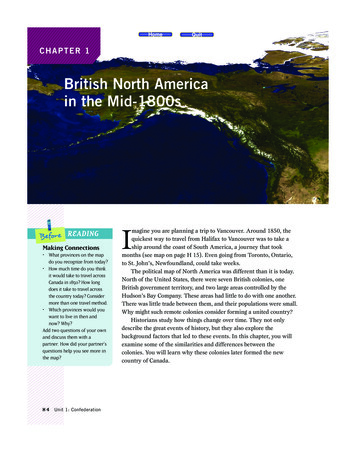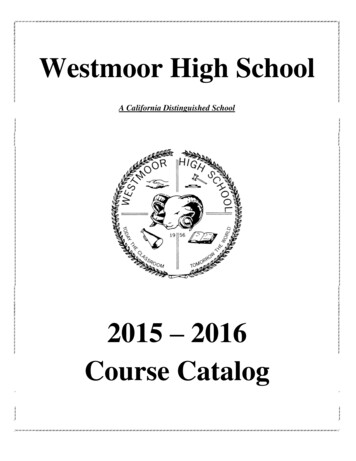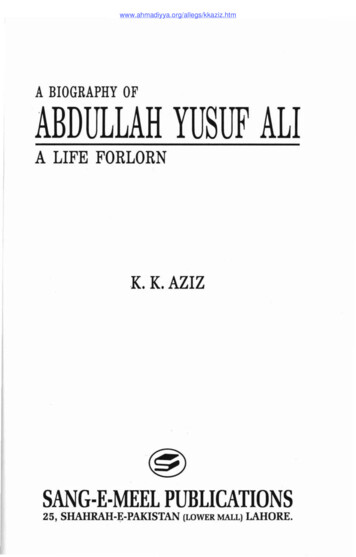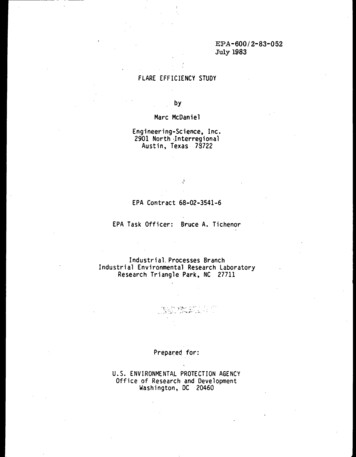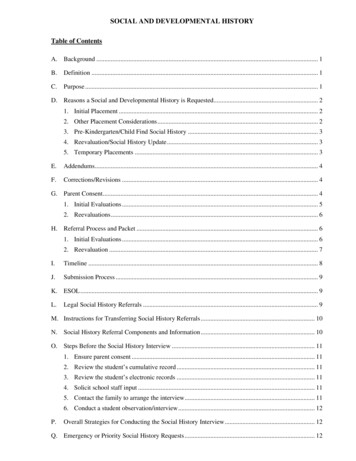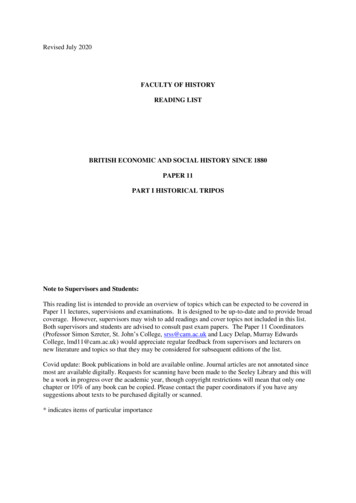
Transcription
Revised July 2020FACULTY OF HISTORYREADING LISTBRITISH ECONOMIC AND SOCIAL HISTORY SINCE 1880PAPER 11PART I HISTORICAL TRIPOSNote to Supervisors and Students:This reading list is intended to provide an overview of topics which can be expected to be covered inPaper 11 lectures, supervisions and examinations. It is designed to be up-to-date and to provide broadcoverage. However, supervisors may wish to add readings and cover topics not included in this list.Both supervisors and students are advised to consult past exam papers. The Paper 11 Coordinators(Professor Simon Szreter, St. John’s College, srss@cam.ac.uk and Lucy Delap, Murray EdwardsCollege, lmd11@cam.ac.uk) would appreciate regular feedback from supervisors and lecturers onnew literature and topics so that they may be considered for subsequent editions of the list.Covid update: Book publications in bold are available online. Journal articles are not annotated sincemost are available digitally. Requests for scanning have been made to the Seeley Library and this willbe a work in progress over the academic year, though copyright restrictions will mean that only onechapter or 10% of any book can be copied. Please contact the paper coordinators if you have anysuggestions about texts to be purchased digitally or scanned.* indicates items of particular importance
TOPICS1. Economic Performance, 1880-19142. Class in Victorian and Edwardian Britain3. Social Problems and Social Policy, 1880-19394. A Consumer Society? 1880-19395. Fertility Decline and Marital Sexuality, 1880-19396. Mortality, Medicine and Health, 1880-19397. Gender Roles and Relations, 1880-19398. The First World War and its Aftermath9. Interwar Economic Performance10. Class in Interwar Society11. The Second World War and its Aftermath12. Economic Performance, 1945-197913. The Climax and Crisis of the Welfare State, 1939-197914. A Polarised Society? Britain post 197515. Class and Social Change since 194516. Gender Roles and Experiences since 193917. Environmental Change and Policy18. Education19. Faith and Belief20. Crime and Punishment21. Race and Immigration22. Mass Culture23. Youth and Youth Cultures24. National Images: History, Modernity, Englishness, Empire14/09/20202
GENERAL TEXTSGood general surveys of the period are P. Johnson (ed.), Twentieth-Century Britain: Economic,Social and Cultural Change (1994) [TCB], and F. Carnevali and J-M. Strange (eds) TwentiethCentury Britain. Economic, Cultural and Social Change (2nd ed., 2007) [TCB2]. Although the latter ismeant to be an updating of the former, they offer different perspectives and are both worth consulting(and comparing).Other surveys of aspects of the period:F.M.L. Thompson (ed.), The Cambridge Social History of Britain 1750-1950, 3 vols. (1990)[SHB]R. Floud & P. Johnson (eds), The Cambridge Economic History of Modern Britain, vol. II,1860-1939, vol. III, 1939-2000 (3rd edition 2004) [EHB]R.Floud, J.Humphries and P.Johnson, eds, The Cambridge Economic History of ModernBritain: Volume 2, Growth and Decline, 1870 to the Present (4th edn 2014) [CEHMB].M. Daunton (ed.), The Cambridge Urban History of Britain, vol. III, 1840-1950 (2000) [UHB]H. Perkin, The Rise of Professional Society: England since 1880 (1988)M. Daunton, Wealth and Welfare: An Economic and Social History of Britain 1851-1951 (2007)I. Zweiniger-Bargielowska (ed.), Women in Twentieth-Century Britain (2001)L. Abrams and C. Brown, A History of Everyday Life in Twentieth-Century Scotland (2010)M. Johnes, Wales since 1939 (2012)J. White, London in the Twentieth Century (2001)P. Clarke, Hope and Glory: Britain 1900-2000 (2004)J. Vernon, Modern Britain, 1750 to the Present (2017)C. Renwick, Bread for All: The Origins of the Welfare State (2017)P. Thane, Divided Kingdom. A history of Britain, 1900 to the Present (2018)Important surveys which cover large parts of the period:J. Harris, Private Lives Public Spirit: A Social History of Britain 1870-1914 (1993)G. Searle, A New England? Peace and War 1886-1918 (2004)K. Robbins (ed.), The British Isles 1901-1951 (2002)R. McKibbin, Classes and Cultures: England 1918-1951 (1998)K. Burk (ed.), The British Isles since 1945 (2002)G. Bernstein, The Myth of Decline: The Rise of Britain since 1945 (2004)D. Edgerton, The Rise and Fall of the British Nation: A Twentieth-Century History (2018)Journals which regularly publish contributions relevant to this paper:Economic History Review (EcHR)Past and Present (P&P)Historical Journal (HJ)Journal of British Studies (JBS)History Workshop Journal (HWJ)Transactions of the Royal Historical Society (TRHS)Twentieth-Century British History (TCBH)Contemporary British History (post-1945; formerly Contemporary Record) (CBH)Useful works of reference:Office for National Statistics (www.statistics.gov.uk): Economic Trends (1953-), Social Trends(1970-), General Household Survey (1971-2007), now General Lifestyle Survey (2008-)14/09/20203
Cultural Trends (1989-), formerly published by the Policy Studies Institute, now RoutledgeA.H. Halsey (ed.), Twentieth-Century British Social Trends (2000)Bibliography of British and Irish History (http://www.brepolis.net) - very specific subject and authorsearches can be done (from cam domain or via Raven)Oxford Dictionary of National Biography (www.oxforddnb.com) - indispensable, fully searchable(from cam domain or via Raven)Primary sources:Although the bulk of the reading for this paper comprises secondary sources – the historical literatureon the period – much can also be gained by sampling the rich primary sources for this period readilyavailable in print and online. Suggestions for some historically-revealing novels and documentarysources are scattered throughout the reading list. In addition, the following websites can berecommended for access to visual and aural sources.http://www.screenonline.org.uk/ - film and televisionhttp://www.bfi.org.uk/inview/ - documentary film and televisionhttp://www.colonialfilm.org.uk/ - film of imperial lifehttp://www.britishpathe.com/ - newsreel, 1896-1976http://sounds.bl.uk/ - archival sound recordingsFinally, much social and economic history – and also increasingly some cultural history – for thisperiod is based on the many social-scientific surveys undertaken across the twentieth century. Whilethe published reports of these surveys can often be found in the reading lists that follow, it is alsopossible for students to access the raw data of these surveys, often in easy and interesting ways. Forone key repository for this data, see the Economic and Social Data Service (http://www.esds.ac.uk/).You can login via your Raven account. The ‘Teaching’ ) offers an easy way in.14/09/20204
1. Economic Performance, 1880-1914The ‘failure’ of the late Victorian and Edwardian economy; the origins of ‘declinsim’; the impact ofsteam and electricity; globalization and the domestic, imperial and international markets.GeneralC. Schenk, ‘Britain’s Changing Position in the International Economy’, in Carnevali andStrange (eds), TCB2S.N. Broadberry, The Productivity Race: British Manufacturing in International Perspective,1850-1990 (1997)* S.N. Broadberry, Market Services and the Productivity Race, 1850-2000: BritishPerformance in International Perspective (2006)* N.F.R. Crafts, 'Economic growth during the long twentieth century', in Floud, Humphries &Johnson (eds), CEHMBK.H. O'Rourke, 'From Empire to Europe: Britain in the world economy', in Floud, Humphries& Johnson (eds), CEHMB‘Decline’: Myths, Anxieties, RealitiesS. Pollard, Britain’s Prime and Britain’s Decline: The British Economy, 1870-1914 (1987)* B. Supple, ‘Fear of Failing: Economic History and the Decline of Britain’, EcHR 1994C. Feinstein, ‘Slowing Down and Falling Behind: Industrial Retardation in Britain after 1870’, in A.Digby et al. (eds), New Directions in Economic and Social History, vol. 2 (1992)P. Clarke & C. Trebilcock (eds), Understanding Decline: Perceptions and Realities of BritishEconomic Performance (1997)J.-P. Dormois & M. Dintenfass (ed.), British Industrial Decline (1999)* S.N. Broadberry, ‘How did the United States and Germany overtake Britain?: A Sectional Analysisof Comparative Productivity Levels, 1870-1990’, Journal of Economic History 1998* N. Crafts, ‘Long-Run Growth’, S. Broadberry, ‘Human Capital and Skills’, G.B. Magee,‘Manufacturing and Technological Change’, T. Nicholas, ‘Enterprise andManagement’, in Floud & Johnson (eds), EHB, vol. IIH. Berghoff & R. Moller, ‘Tired Pioneers and Dynamic Newcomers? A Comparative Essay onEnglish and German Entrepreneurial History, 1870-1914’, EcHR 1994S. Broadberry, ‘Anglo-German Productivity Differences, 1870-1990: A Sectoral Analysis’, EuropeanReview of Economic History 1997M.W. Kirby, ‘Institutional Rigidities and Economic Decline: Reflections on the British Experience’,EcHR 1992D. Edgerton & S.M. Horrocks, ‘British Industrial Research and Development before 1945’, EcHR1994D. Edgerton, Science, Technology and the British Industrial ‘Decline’, 1870-1970 (1996)F. Trentmann, Free Trade Nation (2008)Global and Imperial Contexts* C. K. Harley, ‘Trade 1870–1939: From Globalisation to Fragmentation’, M. Edelstein,‘Foreign Investment, Accumulation and Empire, 1860–1914’, in Floud & Johnson (eds),EHB, vol. IIS.N. Broadberry & N.F.R. Crafts (eds) Britain in the International Economy (1992)K.H. O’Rourke & J.G. Williamson, Globalization and History: The Evolution of a 19thCentury Atlantic Economy (1999)M. Wilkins, ‘The Free Standing Company, 1870-1914: An Important Type of British Foreign DirectInvestment’, EcHR 1988G. Jones, Merchants to Multinationals: British Trading Companies in the 19th and 20thCenturies (2000)14/09/20205
Y. Cassis, ‘Financial Elites in Three European Centres: London, Paris, Berlin, 1880s-1930s’,Business History 1991P.K. O’Brien, ‘The Costs and Benefits of British Imperialism, 1846-1914’, P&P 1988 and debate withP. Kennedy, P&P 1989A. Offer, ‘The British Empire, 1870-1914: A Waste of Money’, EcHR 1993A. Offer, ‘The British Empire: Costs and Benefits, Prosperity and Security, 1870-1914’, in A.N.Porter (ed.), The Oxford History of the British Empire, vol. III: The Nineteenth Century(1999)* P.J. Cain & A.G. Hopkins, ‘Gentlemanly Capitalism and British Expansion Overseas, II: NewImperialism, 1850-1945’, EcHR 1987M.J. Daunton, ‘Gentlemanly Capitalism and British Industry, 1820-1914’, P&P 1989, and debate withW.D. Rubinstein, P&P 1991A. Offer, The First World War: An Agrarian Interpretation (1989)J. Belich, Replenishing the Earth: The Settler Revolution and the Rise of the Anglo-World,1783-1939 (2009), part 3G.B. Magee and A.S. Thompson, Empire and Globalisation: Networks of People, Goods andCapital in the British World, c. 1850-1914 (2010)14/09/20206
2. Class in Victorian and Edwardian BritainThe making of the modern class system?; ‘gentrification’ of the bourgeoisie; social mobility andimmobility between working and middle classes; working-class culture: work, community, leisure.General* D. Cannadine, Class in Britain (1998), chs. 3, 4A. Miles, ‘How Open was Nineteenth-Century British Society?: Social Mobility and Equality ofOpportunity, 1839-1914’, in A. Miles & D. Vincent (eds), Building European Society:Occupational Change and Social Mobility in Europe, 1840-1940 (1993)A. Reid, Social Classes and Social Relations in Britain 1850-1914 (1992)A. Howkins, Reshaping Rural England: A Social History, 1850-1925 (1991)D.C. Coleman, ‘Gentlemen and Players’, EcHR 1973N. McKendrick, ‘Gentlemen and Players Revisited: The Gentlemanly Ideal, The BusinessIdeal, and the Professional Ideal in English Literary Culture’, in N. McKendrick & R.B.Outhwaite (eds), Business Life and Public Policy (1986)P. Thompson, The Edwardians: The Remaking of British Society, 2nd ed. (1992)* M. Savage & A. Miles, The Remaking of the British Working Class, 1840-1940 (1994)A. August, The British Working Class, 1832–1940 (2007)W.D. Rubinstein, Men of Property: The Very Wealthy in Britain since the Industrial Revolution(1981)D. Cannadine, The Decline and Fall of the British Aristocracy (1990)A. Kidd and D. Nicholls, ‘Introduction: History, Culture and the Middle Classes’, in Gender, CivicCulture and Consumerism (1999)E. Hobsbawm, ‘The Making of the Working Class, 1870-1914’ in Worlds of Labour (1984) orUncommon People (1998)Community* E. Ross, Love & Toil: Motherhood in Outcast London, 1870-1918 (1993)A. Davin, Growing Up Poor: Home, School and Street in London 1870-1914 (1996)R. Roberts, The Classic Slum (1971)B.S. Rowntree, Poverty: A Study of Town Life (1899)M. Pember Reeves, Round About a Pound a Week (1913), excerpted in E. Ross (ed.), SlumTravellers: Ladies and London Poverty, 1860-1920 (2007)R.Q. Gray, The Aristocracy of Labour in Nineteenth-Century Britain (1981)H. Pelling, ‘The Concept of the Labour Aristocracy’, in Pelling, Popular Politics and Society in LateVictorian Britain (1968)* A.J. Reid, ‘Intelligent Artisans and Aristocrats of Labour: The Essays of Thomas Wright’, inJ. Winter (ed.), The Working Class in Modern British History (1983)G.J. Crossick, The Lower Middle Class in Britain (1977)J. Lawrence, Speaking for the People: Party, Language and Popular Politics in England, 18671914 (2002), ch. 2R.H. Trainor, Black Country Elites: The Exercise of Authority in an Industrialized Area, 18301900 (1993)* S. Szreter, ‘Communication Communities’ Fertility, Class and Gender (1996), pp.546-55.D.K. Drummond, Crewe: Railway Town, Company and People, 1840-1914 (1995)T. Griffiths, The Lancashire Working Classes c. 1880-1930 (2001)* S. Pooley, ‘All we parents want is that our children's health and lives should be regarded’: ChildHealth and Parental Concern in England, c. 1860–1910’ Social History of Medicine (2010)S. Koven, Slumming: Sexual and Social Politics in Victorian London (2004)S. Koven, The Match Girl and the Heiress (2014)14/09/20207
E. Buettner, Empire families: Britons and late imperial India (2004)J. Hyslop, ‘The Imperial Working Class Makes Itself White: White Labourism in Britain, Australia,and South Africa before the First World War’ Journal of Historical Geography (1999)Work and LeisureJ. Harris, Private Lives Public Spirit: A Social History of Britain 1870-1914 (1993), ch. 5M. Savage, ‘Career Mobility and Class Formation: British Banking Workers and the Lower MiddleClasses’, in A. Miles & D. Vincent (eds), Building European Society: Occupational Changeand Social Mobility in Europe, 1840-1940 (1993)C.J. Wrigley (ed.), A History of British Industrial Relations 1875-1914 (1982)C. Chinn, They Worked All Their Lives: Women of the Urban Poor 1880-1939 (1988)E. Roberts, Women’s Work 1840-1940 (1988)* P. Johnson, Saving and Spending: The Working Class Economy in Britain 1870-1939 (1985)T. Alborn, ‘Senses of Belonging: The Politics of Working-Class Insurance in Britain, 1880-1914’,Journal of Modern History 2001* R. McKibbin, ‘Working-Class Gambling in Britain 1880-1939’ and ‘Work and Hobbies inBritain 1880-1950’, in McKibbin, The Ideologies of Class: Social Relations in Britain1880-1950 (1990)P. Joyce, Visions of the People: Industrial England and the Question of Class 1848-1914 (1991)C. Waters, British Socialists and the Politics of Popular Culture 1884-1914 (1990)T. Mason, Association Football and English Society, 1863-1915 (1979)J. Lowerson, Sport and the English Middle Classes, 1870-1914 (1993)C. Bressey, 'Looking for Work: The Black Presence in Britain, 1860-1920' Immigrants and Minorities(2010)L. Tabili, Global Migrants, Local Culture: Natives and Newcomers in Provincial England,1841-1939 (2011)14/09/20208
3. Social Problems and Social Policy, 1880-1939The growth of the State: national efficiency, New Liberalism, socialism; social conditions and theirinvestigation: unemployment, poverty, health and housing; social reform and philanthropy.Overviews* J. Harris, Private Lives Public Spirit: A Social History of Britain 1870-1914 (1993), chs 2, 7-8M. Daunton (ed.), UHB, vol. III, esp. chs 1, 7, 9, 11, 12, 14-16P. Thane, ‘Government and Society in England and Wales, 1750-1914’, and J. Harris, ‘Society andthe State in 20th-Century Britain’, in F.M.L. Thompson (ed.), SHB, vol. IIIM. Daunton, ‘The role of the state: taxation, citizenship and welfare reforms’ in Carnevali andStrange (eds), TCB2M. Levine-Clark, Unemployment, Welfare, and Masculine Citizenship: Britain, 1870-1930(2015)B. Harris, Origins of the British Welfare State (2004)G. Searle, A New England? Peace and War 1886-1918 (2004), chs 6, 11P. Thane (ed.), The Origins of British Social Policy (1978)A. Crowther, Social Policy in Britain 1914-1939 (1988)D. Vincent, Poor Citizens: The State and the Poor in Twentieth-Century Britain (1991)J. Vernon, Hunger: A Modern History (2007)P. Baldwin, The Politics of Social Solidarity: Class Bases of the European Welfare State 1875-1975(1990), chs 1-2J.E. Cronin, The Politics of State Expansion: War, State and Society in 20th-Century Britain (1991)P. Johnson, ‘Risk, Redistribution and Social Welfare in Britain from the Poor Law toBeveridge’, in M. Daunton (ed.), Charity, Self-Interest and Welfare (1996)* M.J. Daunton, ‘Payment and Participation: Welfare and State-Formation in Britain, 1900-1951’,P&P 1996* S. Koven & S. Michel, ‘Womanly Duties: Maternalist Policies and the Origins of the Welfare Statein France, Germany, Great Britain and the United States, 1880-1920’, American HistoricalReview 1990* J. Harris, ‘Political Thought and the Welfare State, 1870-1940’, P&P 135 (1992)R. Davidson & R. Lowe, ‘Bureaucracy and Innovation in British Welfare Policy 1870-1945’, in W.J.Mommsen (ed.), The Emergence of the Welfare State in Britain and Germany 1850-1950(1981)Social ConditionsR. McKibbin, ‘Class and Poverty in Edwardian England’, in McKibbin, The Ideologies of Class:Social Relations in Britain 1880-1950 (1990)P. Johnson, Saving and Spending: The Working Class Economy in Britain 1870-1939 (1985)E. Griffin, Bread Winner: An Intimate History of the Victorian Economy (2020)B.S. Rowntree, Poverty: A Study of Town Life (1899)E. Ross, Love and Toil: Motherhood in Outcast London, 1870-1918 (1993)A. John (ed.), Unequal Opportunities: Women’s Employment 1800-1918 (1986)M. Daunton, House and Home in the Victorian City: Working-Class Housing 1850-1914 (1983)C.G. Pooley (ed.), Housing Strategies in Europe 1880-1930 (1992), chs 1, 4R. Floud et al., Height, Health, and History: Nutritional Status in the United Kingdom, 1750-1980(1990)S. Szreter, ‘Mortality and Public Health 1815-1914’, in A. Digby et al. (eds), New Directions inEconomic and Social History, vol. II (1992)J.M. Winter, ‘The Decline of Mortality in Britain, 1870-1950’, in T. Barker & M. Drake (eds),Population and Society in Britain (1982)14/09/20209
Social PolicyJ.R. Hay, The Origins of the Liberal Welfare Reforms 1906-1914 (1975)G. Searle, The Quest for National Efficiency (1971)J. Harris, William Beveridge: A Biography, 2nd ed. (1997)R. Davidson, ‘The Board of Trade and Industrial Relations, 1896-1914’, HJ 21 (1978)J. Harris, Unemployment and Politics, 1886-1914 (1972)B. Harris, ‘Unemployment and the Dole in Interwar Britain’, in P. Johnson (ed.), TCB* P. Thane, ‘The Working Class and State ‘Welfare’ in Britain, 1880-1914’, HJ 1984* M. Pugh, ‘Working-Class Experience and State Social Welfare, 1908-1914: Old-Age PensionsReconsidered’, HJ 2002P. Thane, ‘Women in the British Labour Party and the Construction of State Welfare, 1906-1939’, inS. Koven & S. Michel (eds), Mothers of a New World (1993)* J. Harris, ‘Did British Workers Want the Welfare State?’, in J.M. Winter (ed.), The Working Classin Modern British History (1983)S. Szreter, ‘The Importance of Social Intervention in Britain’s Mortality Decline, 1850-1914: AReinterpretation’, Social History of Medicine 1988P. Baldwin, Contagion and the State in Europe 1830-1930 (1999)D. Dwork, War Is Good for Babies & Other Young Children: A History of the Infant and ChildWelfare Movement in England 1898-1918 (1987)P.M. Thane, ‘The Debate on the Declining Birth-Rate in Britain: The “Menace” of an AgeingPopulation, 1920s-1950s’, Continuity and Change 1990M. Thomson, The Problem of Mental Deficiency: Eugenics, Democracy and Social Policy in Britain,c.1870-1959 (1998)M. Wiener, Reconstructing the Criminal: Culture, Law and Policy in England, 1830-1914 (1990), chs4-9S. Pedersen, Family, Dependence and the Origins of the Welfare State: Britain and France 1914-1945(1993)S. Pedersen, ‘Eleanor Rathbone’ in S. Pedersen & P. Mandler (eds), After the Victorians (1994)D. Thom, ‘Wishes, Anxieties, Play and Gestures: Child Guidance in Inter-War England’, in R.Cooter (ed.), In the Name of the Child: Health and Welfare 1880-1940 (1992)N. Whiteside, ‘Private Provision and Public Welfare: Health Insurance Between the Wars’, inD.Gladstone (ed.), Before Beveridge: Welfare Before the Welfare State (1999)J.M. Winter, ‘Public Health and the Extension of Life 1901-60’, in M. Keynes (ed.), The PoliticalEconomy of Health and Welfare (1988)* C. Webster, ‘Health, Welfare and Unemployment During the Depression’, P&P 1985C.G. Pooley, ‘England and Wales’, in Pooley (ed.), Housing Strategies in Europe 1880-1930 (1992)R. Shilliam, Race and the Undeserving Poor (2018), chs. 3, 4.L. Bland and L. Hall ‘Eugenics in Britain: The View from The Metropole’ in Bashford and Levine,eds., The Oxford Handbook of the History of Eugenics (2010)See also 6. Mortality, Medicine and Health, 1870-194514/09/202010
4. A Consumer Society?, 1880-1939Standards and definitions: disposable income, new goods and new markets, conspicuousconsumption; consumption and the city; consumption and gender; the ‘citizen consumer’.Overviews* P. Gurney, The Making of Consumer Culture in Modern Britain (2017), parts 2-3P. Scott, The Making of the Modern British Home: The Suburban Semi and Family LifeBetween the Wars (2013), esp. ch. 9.P. Scott, The Market Makers: Creating Mass Markets for Consumer Durables in Inter-WarBritain (2017)* S. Bowden, ‘The New Consumerism’, in P. Johnson (ed.), TCBP. Scott, ‘Consumption, Consumer Credit and the Diffusion of Consumer Durables’, inCarnevali and Strange (eds), TCB2A. Offer, ‘Consumption and affluence c.1870-2010’, in Floud, Humphries & Johnson (eds),CEHMB, vol. IIIan Gazeley, ‘Income and Living Standards’, in Floud, Humphries & Johnson (eds), CEHMB,vol. IIG. Boyer, ‘Living Standards, 1860–1939’, in Floud & Johnson (eds), EHB, vol. IIM. Hilton, Consumerism in Twentieth-Century Britain (2003), part IR. McKibbin, Classes and Cultures: England 1918-1951 (1998), chs 3, 5Consumer Goods and ExperiencesD.J. Oddy, ‘Food, drink and nutrition’, and H. Cunningham, ‘Leisure and culture’, in F.M.L.Thompson (ed.), Cambridge Social History of Britain 1750-1950, vol. II (1990)J. Benson & G. Shaw (eds), The Evolution of Retail Systems, c. 1800-1914 (1992)* P. Johnson, Saving and Spending: The Working-Class Economy in Britain 1870-1939 (1985)J. Bourke, Working-Class Cultures in Britain 1890-1960 (1994), chs 3-4A. Briggs, Victorian Things (1988)E. Rappaport, A Thirst for Empire: How Tea Shaped the Modern World (2017)L. Ugolini, Men and Menswear: Sartorial Consumption in Britain, 1880-1939 (2007)M. Hilton, Smoking in British Popular Culture, 1800-2000 (2000)C. Ehrlich, The Piano: A History, rev. ed. (1990), esp. chs 5, 10J. Nott, Music for the People: Popular Music and Dance in Interwar Britain (2002)T. Logan, The Victorian Parlour (2001)S. Muthesius, The English Terraced House (1982)A.A. Jackson, Semi-Detached London (1991)S. Barson, ‘Infinite Variety in Brick and Stucco, 1840-1914’, in A. Saint et al., London Suburbs(1999)D.S. Ryan, The Ideal Home Through the 20th Century (1997), ch. 1-3S. Bowden & A. Offer, ‘Household Appliances and the Use of Time: The United States and Britainsince the 1920s’, EcHR 1994, and debate with B. Fine, EcHR 1999* P. Scott, ‘The Twilight World of Interwar British Hire Purchase’, P&P 2002J. Bengry, ‘Courting the Pink Pound: Men Only and the Queer Consumer, 1935-39’, HistoryWorkshop Journal (2009)Cultures of ConsumptionM. Hilton, ‘The Fable of the Sheep, or Private Virtues, Public Vices: The Consumer Revolution ofthe Twentieth Century’, P&P 2002P. Johnson, ‘Conspicuous Consumption and Working-Class Culture in Late Victorian and EdwardianBritain’, TRHS 198814/09/202011
T. Alborn, ‘Senses of Belonging: The Politics of Working-Class Insurance in Britain, 1880-1914’,Journal of Modern History 2001L.A. Loeb, Consuming Angels: Advertising and Victorian Women (1994)* E. Rappaport, Shopping for Pleasure: Women in the Making of London’s West End (2000)* J.R. Walkowitz, Nights Out: Life in Cosmopolitan London (2012)B. Shannon, ‘ReFashioning Men: Fashion, Masculinity and the Cultivation of the Male Consumer inBritain, 1860-1914’, VS 2004C. Breward, The Hidden Consumer: Masculinities, Fashion and City Life 1860-1914 (1999)R. Gagnier, The Insatiability of Human Wants: Economics and Aesthetics in Market Society (2000),chs 1-4M. Hilton, ‘Advertising the Modernist Aesthetic of the Marketplace? The Cultural RelationshipBetween the Tobacco Manufacturer and the ‘Mass’ of Consumers in Britain, 1870-1940’, inM. Daunton & B. Rieger (eds), Meanings of Modernity (2001)F. Trentmann, ‘Bread, Milk and Democracy in Modern Britain: Consumption and Citizenship inTwentieth-Century Britain’, in M. Daunton & M. Hilton (eds), The Politics of Consumption(2001)F. Trentmann, ‘Civil Society, Commerce and “the Citizen-Consumer”’, in Trentmann (ed.),Paradoxes of Civil Society: New Perspectives on the Evolution of Civil Society in ModernBritain and Germany (2000)D. Holland, ‘Toffee Men, Travelling Drapers and Black-Market Perfumers–South Asian Networks ofPetty Trade in Early Twentieth Century Britain’, Twentieth Century British History (2019)14/09/202012
5. Fertility Decline and Marital Sexuality, 1880-1939The demographic transition and the decline of fertility; diverse class and regional fertility and sexualcultures; sex and birth control in practice and in public discourse.OverviewsJ. Harris, Private Lives Public Spirit: A Social History of Britain 1870-1914 (1993), chs 2-3M. Anderson, ‘The Social Implications of Demographic Change’, in F.M.L. Thompson (ed.),CSB, vol. IIS. Szreter, ‘The Idea of Demographic Transition: A Critical Intellectual History’, Population andDevelopment Review 1993S. Szreter and K.Fisher, Sex Before the Sexual Revolution. Intimate Life in England 1918-63(2010), ch.1.R. McKibbin, Classes and Cultures: England 1918-1951 (1998), ch. 8Debenham, Clare, Birth Control and the Rights of Women, Post-Suffrage Feminism in the EarlyTwentieth Century, London and New York (2014)L. Sigel, Making Modern Love: Sexual Narratives and Identities in Interwar Britain (2012)Changing FertilityJ.A. Banks, Prosperity and Parenthood (1954)J.R. Gillis et al. (eds), The European Experience of Declining Fertility: A Quiet Revolution, 18501970 (1992)W. Seccombe, ‘Starting to Stop: Working Class Fertility Decline in Britain’, P&P 1990, and debatewith R. Woods, P&P 1992J.A. Banks, Victorian Values: Secularism and the Size of Families (1981)R.A. Soloway, Birth Control and the Population Question in England 1877-1930 (1982)* S. Szreter, Fertility, Class and Gender in Britain 1860-1940 (1996), pp. 45-61, 310-22, 350-66, 51358.B. Reay, Microhistories: Demography, Society and Culture in Rural England, 1800-1939 (1996),chs.2,7.K. Fisher and S. Szreter, ‘“They Prefer Withdrawal’: The Choice of Birth Control in Britain, 19181950’, Journal of Interdisciplinary History 2003M. Rothery, ‘The Reproductive Behavior of the English Landed Gentry in the Nineteenth and EarlyTwentieth Centuries’, JBS 2009R. Lestheaghe and C. Wilson, ‘Modes of Production, Secularization and the Pace of the FertilityDecline in Western Europe 1870-1930’, in A.J. Coale and S.C. Watkins (eds), TheDecline of Fertility in Europe (1986)M. Anderson & D.J. Morse, ‘High Fertility, High Emigration, Low Nuptiality: Scotland’sDemographic Experience, 1861-1914’, Population Studies 1993C. Ó Gráda & N. Duffy, ‘The Fertility Transition in Ireland and Scotland c.1880-1930’, in S.J.Connolly et al. (eds), Conflict, Identity and Economic Development: Ireland and Scotland,1600-1939 (1995)* S. Pooley, ‘All we parents want is that our children's health and lives should be regarded’: ChildHealth and Parental Concern in England, c. 1860–1910’ Social History of Medicine (2010)* S.K. Pooley, ‘Parenthood, child-rearing and fertility in England, 1850-1914’, History of the Family,18:1 (2013), pp. 83-106S. Szreter, ‘Fertility, social class, gender and the professional model: statistical explanation andhistorical significance’ EcHR (2015)M. Anderson, Scotland’s Populations (2018), ch. 14Sexual behaviour, family planning and marriage14/09/202013
S. Szreter, Fertility, Class and Gender in Britain 1860-1940 (1996), pp. 367-71, 389-439, 558-78.* K. Fisher, ‘“She was quite satisfied with the arrangements I made”: Gender and Birth Control inBritain, 1920-1950’, P&P 2000K. Fisher, Birth Control, Sex, and Marriage in Britain 1918-1960 (2006)* S. Szreter and K. Fisher, Sex Before the Sexual Revolution. Intimate Life in England 1918-1963(2010), chs.2-3, 6.J. Weeks, Sex, Politics and Society: the Regulation of Sexuality since 1800, 2nd ed. (1993)J. Walkowitz, Prostitution and Victorian Society (1980)P. Howell, ‘A Private Contagious Diseases Act: Prostitution and Public Space in VictorianCambridge’, Journal of Historical Geography 2000A. Bingham, Family Newspapers? : Sex, Private Life, and the British Popular Press 1918-1978(2009)* H. Cook, The Long Sexual Revolution: English Women, Sex, and Contraception 1800-1975(2004), pt. IIH. Cook, ‘Emotion, Bodies, Sexuality, and Sex Education in Edwardian England’, HJ 2012R. Porter & L.A. Hall, The Facts of Life: The Creation of Sexual Knowledge in Britain, 1650-1950(1995), pt. IIG.Frost, ‘”The black lamb of the black sheep”: Illegitimacy in the English working-class, 1850-1939’Journal of So
1. Economic Performance, 1880-1914 2. Class in Victorian and Edwardian Britain 3. Social Problems and Social Policy, 1880-1939 4. A Consumer Society? 1880-1939 5. Fertility Decline and Marital Sexuality, 1880-1939 6. Mortality, Medicine and Health, 1880-1939 7. Gender Roles and Relations, 1880-1939 8. The First World War and its Aftermath 9.




